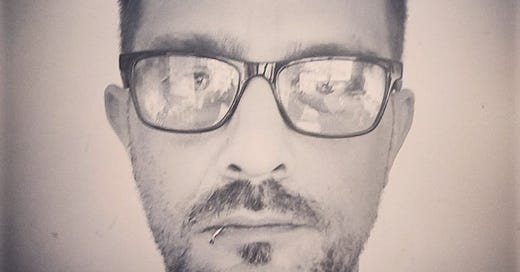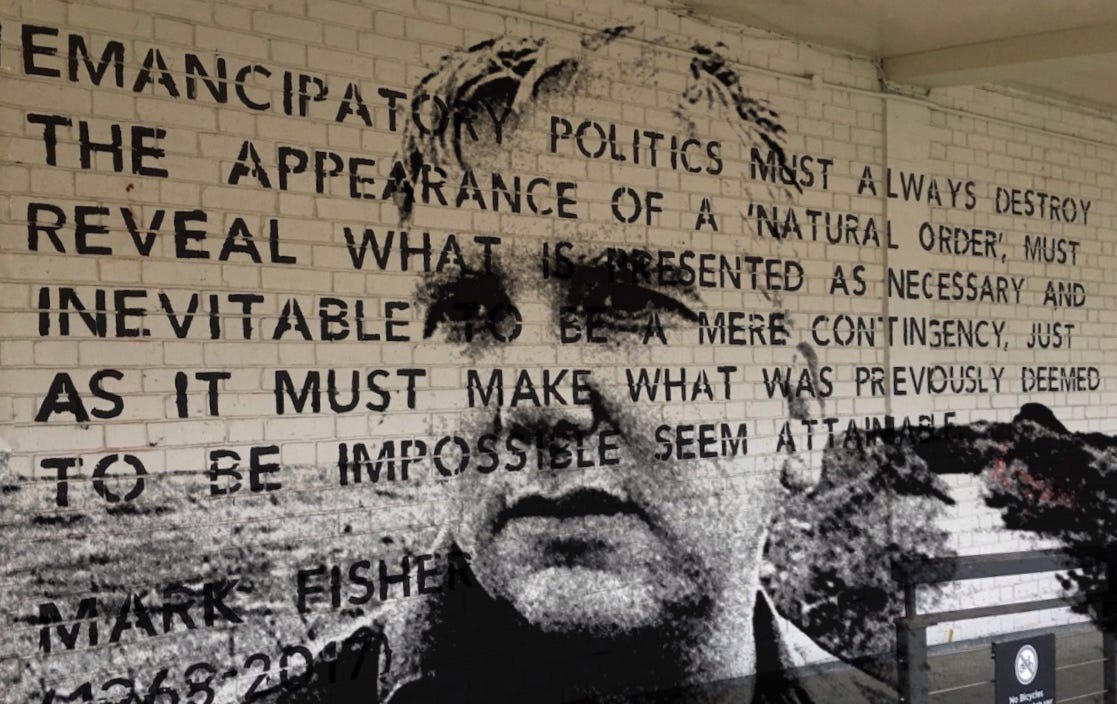Episode 8: The Recovery Myth / Jordan Peterson's Star Wars
Host Bram flies solo, discussing mental health in the work of Byung-Chul Han and Mark Fisher. PLUS! Jordan Peterson's Star Wars!
Episode 8 was a deep dive into the discussion of mental health in the works of Mark Fisher and Byung-Chul Han, with some bonus content on everyone’s favourite Canadian pseudo-academic, and the Hero’s Journey.
If you’ve listened to this month’s episode, you know that it covers some pretty personal territory for me. I won’t lie, I was nervous to share this level of detail about my life and health. I think it’s important to talk about this stuff though, and in particular the discussion of men who live with Borderline Personality Disorder / Emotional Intensity Disorder is under-developed. So much about the condition and those who live with it is widely misunderstood.
The reaction to the episode was amazing, lots of people got in touch to say that the problems I described with conceptualising my diagnosis and symptoms and seeking treatment for them struck a familiar chord. A few listeners told me this was perhaps the first time they had considered the political aspects of living with a chronic or lifelong condition.
Despite the fact we talk a lot in political discourse about welfare, benefits, wellness and ‘epidemics’ of mental health problems, this discussion is rarely seen as personally political. The person with the condition experiences their symptoms alone, and the clear message from society is that their symptoms should be managed, controlled, and if possible, concealed.
Often, aberrant behaviour caused by illness is seen as a personal failing, and so the political nature of a person’s condition can simply disappear into the background noise of shame and self-reproach. It can be lost in the clamour to strive for self-improvement and recovery, to ‘win’ the ‘battle’ against that person’s condition. I’m very pleased if the episode helped a few people to reframe their symptoms, their history, and their struggles in such a way as to alleviate some self-directed stigma, or to help them to demand better treatment.
If anything, I was slightly disappointed by the failure of mental health charities and organisations on Scottish Twitter to retweet and support this episode. It’s vanishingly rare for anyone to discuss BPD/EID in public, rarer still for men to do so. I suppose if I had titled the episode ‘Borderline Personality Disorder and men’ they might have been keener to share it. Maybe Dr. Peterson put them off.
Given the research I referred to, which found that a huge proportion of incarcerated men may have undiagnosed BPD/EID, I feel this matter needs to be discussed more openly. The politics of the current discourse, and our restrictive social norms currently drive the discussion, rather than the human rights and dignity of people with the condition, both male and female.
Perhaps - if I may be allowed to don a tinfoil hat for just a moment - the combination of anti-capitalist political analysis directly linked to mental health conversations is not something that publicly-funded organisations can touch. To my mind, the political and personal aspects of mental health discourse are fundamentally inseparable. The pretence that mental health can be discussed without reference to society, ideology and sociology is bankrupt, and a barrier to delivering effective treatment, or driving social change.
I agree with Mark Fisher, in that I do not think mental health conditions can be cured, managed or mitigated effectively until the foundations of Social Darwinist hypercapitalism are dismantled. For the mentally unwell, revolution is an existential necessity.
Thank you for letting me tell my story. Thank you to those of you who told theirs. Here are some of the books, essays and writers I mentioned in the first half of the episode.
Reading recommendations: Anti-capitalism and mental health
The central text I quoted from and discussed in Episode 8 was Mark Fisher’s Capitalist Realism: Is there no alternative?. Fisher’s seminal work, which proposes both the impossibility of thinking our way beyond capitalism and its utter necessity, is a foundational work for my way of thinking and analysing things, as are the original k-punk essays which led me to Fisher (the collected edition from Repeater Books is a thing of beauty).
Published this week at Zero Books is a new work on Fisher, and the Frankfurt school, as seen through the lens of meme culture. This looks really interesting, and author Mike Watson aka The Acid Left is worth a follow on Instagram. The messy, subversive memes he shares suggest this will be a provocative read. I’ve just ordered a copy of The Memeing of Mark Fisher.
The other two central texts I quoted were both by Byung-Chul Han - Psychopolitics and The Burnout Society are both excellent reads. From his close analysis and development of the theories and social models predicted in Jeremy Bentham’s Panopticon, to his analysis of the cost of capitalist production on human ideals, values and subjective experiences, this is powerful writing, and a nice complement to Fisher.
I talked a little about China and surveillance - one of the pieces I drew on was Wired’s piece on the regime’s social credit system. The information about the persecution, incarceration and reprogramming of Uighur Muslims makes for distressing, chilling reading. It’s out there, but I won’t link to it here.
Staying on surveillance, Nick Bostrom’s ‘vulnerable world’ paper is as provocative as his best-known work on the ‘simulation argument’. Bostrom proposes that the total invasive surveillance of every living person on Earth is not just an inevitability but a desirable necessity. As with his paper on simulations, this is a thought experiment, in which Bostrom unpacks the logic of the theory, drawing on geopolitical analysis, predictive data models and other techniques. It would be easy to misread it as a proposal, and undoubtedly many will do just that.
Henry Giroux’s 2019 essay (on Truthout), Depoliticization Is a Deadly Weapon of Neoliberal Fascism got a brief mention as we moved into the territory of mental health, as did an excellent 2016 essay by Dana Fletcher on ‘concealment’ and bipolar disorder (on HuffPo). Ashley Thomson’s piece on the ‘trickle-down economics’ of mental health treatment (on Overland) is very critical of talking therapies, and she has some valid points to make. Personally, I have found talking therapies indispensable - but they are also a political vector, and Thomson understands this.
Our old friend Ted Kaczynski gets a mention - his ‘manifesto’ Industrial Society and its Futures is widely available online. Here’s a PDF (if you can stomach the now all-too prescient and familiar notes about the failures of identity politics and left ideologies in general).
The sociologist who inspired a lot of Kaczynski’s thinking is the no less cantankerous and reactionary Jacques Ellul, whose misanthropic but cutting insights into the malformation of human beings by ‘technique’ also presciently anticipate our fears about artificial intelligence, and the cold indifference of technological capital to human agency and free will. There’s a PDF of his central thesis The Technological Society available online.
For anyone who found their way here hoping to find out more about BPD/EID, or the treatments I discussed which helped me a great deal, the bad news is that in the UK these resources are not widely available on the NHS, and the condition is severely under-treated and under-resourced compared to better-understood conditions like bipolar or severe depression. Many people with BPD/EID are only diagnosed after coming into conflict with employers, family, or the state, and late interventions are often ineffective. Misdiagnosis (or no diagnosis at all) is so commonplace that it’s an almost universal experience for most who live with BPD/EID.
Dialectical Behavioural Therapy was the principle route to learning to better manage my own BPD/EID symptoms. As I explained on the podcast, it mixes some psychology 101 with techniques from Cognitive Behavioural Therapy, a little bit of Stoicism, a little bit of Zen, a pinch of Twelve Steps, and some features from other ‘compassion-focused’ therapies.
The bad news is it is best delivered/taught in group therapy, according to practitioners; the good news is that it is basically just journalling, when you get right down to it… you can absolutely engage with it solo if you need to.
Here are some starting points:
This website offers ‘recovery resources’ for people with BPD/EID, including a DBT ‘self-study’ guide.
I bought The Dialectical Behavioural Therapy Skills Workbook by Matthew McKay to augment the course of therapy I attended. Be warned: you will be wading through new age platitudes in places, there will be sickening sentimentality at regular intervals, and some of the exercises are - I have to say - dumb. But the stuff that doesn’t work for me could work for you, and vice versa.
This page from UK organisation Mind has some downloadable information, and says it can help you locate treatment (I’d expect that to be harder than it seems, to be honest).
I stumbled across this document from NHS Highland which links to some other resources and guides - it’s surprisingly useful and I am pretty surprised this isn’t something that’s nationally shared and promoted on NHS sites.
A good friend who works as a mental health counsellor (and is also an amazing rapper) recently unpacked for me the best way to find a therapist for one-to-one talking therapies in the UK, while avoiding quacks and overcharging by unscrupulous cowboys. Everyone registered with the British Association for Counselling and Psychotherapy reports to another experienced and qualified therapist about their progress with you, the patient. This ensures the treatment is worthwhile. While regulation around who can and can’t deliver therapy is hard to understand, you can be reasonably sure a BCP member isn’t going to rip you off or treat you poorly. I found an excellent therapist on this site, and it’s searchable by postcode.
You should learn transcendental meditation. Maybe I’ll do an episode on that one day, although I suspect it might be a little boring to talk about at length, if your creepy old uncle Donavan is anything to go by. Please beware the many, many scams, cults and snake oil salesman teaching this utterly vital and transformative technique. I won’t libel anyone on the blog, but do some research and avoid the known crooks. The good news is you only have to learn it once, and can completely ignore all subsequent emails about retreats, refresher courses, and the TM “community”.
Seriously though, if you have any mental health issues at all, learn transcendental meditation. IT’S A POWERFUL TOOL. Listen to David Lynch and escape “the rubber clown suit of negativity.” Why wouldn’t you?
If you believe (like I emphatically don’t) that sharing hashtags, pictures and empty sentiments on social media is enough to drive change, and that ‘raising awareness’ constitutes activism, fill your boots over here, I guess.
I hope that’s helpful. It’s probably not much to go on. My DMs are open, and you can email me at strange.exiles@gmail.com if you want to ask about BPD/EID and the treatment I took part in.
And now… this guy.
So we arrive, inevitably, at the solemn, oak-panelled stateroom of Doctor Jordan ‘Pennywise’ Peterson, a man who looks like a haunted fart, and writes with all the elegance of Dan Brown mashing the keyboard in a dimly-lit room.
I wrote this section of the episode as a riff really, a thought experiment on the enduring significance and common misapprehension of Joseph Campbell’s The Hero with a Thousand Faces, widely known as one of the central inspirations for the Star Wars trilogy (long before it was a franchise).
I don’t think there’s much more to unpack here, but I hope you enjoyed the section as a little restorative following the heaviness of the first part. I’ll finish with an observation about Doctor P, made by a very well-known and insightful person; someone who will in fact be featuring on our very special tenth episode. You’ll hear the thought in his own words when the episode drops, and I won’t reveal his identity (spoilers!), but the following seems true to me.
Jordan Peterson’s appeal to young men is totally understandable. We live in a fundamentally broken society. Young men have been failed by this society, and this has produced a great many angry, lost, potentially dangerous individuals, marked by an immobilising ideology of shame and self-negation that they can only combat with external aggression.
Peterson’s half-baked dogma appeals to young men who perhaps come from deprived or abusive backgrounds, or who have experienced poverty and deprivation; or the privileged who nonetheless lacked a father figure, or those with a combative relationship with authority and hierarchy. The simplistic, self-reliant doctrine Peterson offers is perhaps the first time they have encountered a way of thinking and seeing the world that can help them to structure their lives, and gain some semblance of control. That’s a powerful idea, especially to the powerless.
The danger, I think, is what comes along with Peterson’s ‘tidy your room’ pronouncements, delivered as if they were holy wisdom. His regressive, conservative morality and blinkered reading of history, economics, mythology and politics offers no way forward, only a way back. Like incel ideology, his philosophy will cannibalise itself - and as Peterson’s own trials and tribulations attest, they do not necessarily lead to happiness, fulfilment, or even self-reliance. Just to more shame, and dark choices. Accelerationist memes and incel dreams.
In this light, Slavoj Žižek’s anticipated trouncing of Peterson, which became instead a gentle rebuke to his sixth-form readings of Marx, makes a bit more sense (the gentlest philosophy prize-fight in history is available to watch in full online, if you have 3 hours to spare).
Žižek, scion and scourge of what he calls ‘pure ideology’, sensibly saw no gain in defeating or ridiculing Peterson. Instead, his lecture was a benevolent masterclass on the messiness of contemporary discourse - of which Peterson is an emblematic car crash, and his followers the casualties.
If only Žižek’s books weren’t so f***ing long… What if dialectical materialism could be explained, but… faster?!
Coming up: Katie Sulatyicki’s 60-second philosophy
Next episode’s guest is the fabulous Katie Sulatycki, whose Instagram has become a home for Sex and The City-inspired philosophy memes, and a series of popular ‘explainer’ videos she’s been calling ‘60-second philosophy’.
In these fast-paced, funny and wildly well-informed bite-sized chunks, she explores the most complicated ideas from the deepest thinkers through the ages.
Our conversation was a really fun hour, covering existentialism, the death of popular philosophy, Žižek’s famous Herman Melville riff (Bartleby’s ‘I would prefer not to’), Descartes ‘cogito’, the corporate commodification of Stoicism, and how memes might just reverse the decline of the ‘public intellectual’.
I hope you enjoyed Episode 8. Look out for Episode 9 before the end of this month.
Subscribe at sptfy.com/strangeexiles
Follow @strangeexiles for updates
All subscribe links and episodes at anchor.fm/strangeexiles
Take care of each other.
- Bram E Gieben, Glasgow, September 2021








This is great, and your point on JP is totally correct :) Hopefully this is interesting to you (and others) but we have a whole podcast dedicated to mental health and capitalism, It’s Not Just In Your Head: https://podcasts.apple.com/gb/podcast/its-not-just-in-your-head/id1508932075